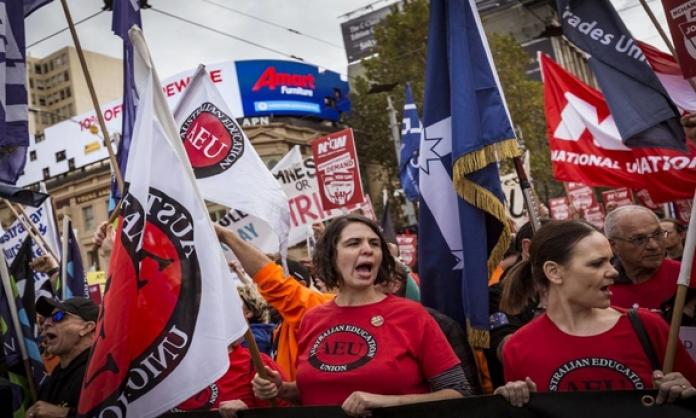I’m near the back of the march when we moved off from Trades Hall. Turning from Russell Street into La Trobe, I can see the colossal crowd stretching to the top of the hill on William St. “Look at us all! Look up the street!”, I start shouting at my fellow marchers, waving at the crowd in front of us.
A guy at the tram stop doesn't seem as excited as me. “They’ve been turning into William Street for ages”, he assures me, matter-of-factly.
I feel anything but matter-of-fact. I belt along La Trobe Street trying to make up the distance, but by the time I get to the courts in William Street, the speeches have finished and everyone is moving off. I'm maybe halfway up the length of the crowd.
I keep moving quickly to catch the front of the rally, but never quite make it. Partly this is due to the huge length of the march. Partly it’s because I keep running into friends and comrades, all walking a foot taller for being part of the biggest workers’ protest in this country in a decade or more.
A farm worker from the National Union of Workers stops me to say hello. He’s involved in one of the best union stories in this country at the moment: a successful organising drive among farm workers on a bewildering variety of visas, some on no visas at all and many with the actual mafia as an employer. He’s come down from Shepparton for the day, brimming with pride: he’s helped mobilise two bus loads of his fellow farm workers for the rally.
“That’s fantastic! On strike?”, I ask.
“Of course!” he replies. “All on strike.”
It's not just the farm workers. I bump into a worker from one of the Port of Melbourne's container terminals. Things have been a bit prickly there for the past few months: dozens of workers were put on first and final warnings for stopping in solidarity with the epic VIC Terminals dispute before Christmas.
For the rally today, the workers asked for four hours of union leave, as allowed under their enterprise agreement. Management turned them down. The union asked for access to the site for a meeting. Management turned them down. The result? A meeting out the gate, which votes unanimously to stop the terminal to enable attendance at the rally.
Later in the day, a friend forwards me a report from the Financial Review. There is much wailing and gnashing of teeth from the employers; most of the Port of Melbourne shut down for the demonstration. Everyone gets a bit more confidence when we’re all stopping together.
I chat with workers on strike from Melbourne Uni. The campus is no powerhouse of unionism, but a solid couple of hundred workers marched off the job to join the rally as part of their enterprise bargaining dispute. I chat with a few of them. They’re appropriately modest about their industrial achievements, but rapt to be part of this crowd.
The same goes for warehouse workers and call centre workers I bump into. “How good is this?!”, is the common exclamation, followed by some version of a common story: “There’s only 10 or 15 from our work today, should be more, but everyone will hear all about it back at work tomorrow!”
I run into clusters of former workmates from my time in construction. Everyone knows the problems facing the union. The finishing trades are a mess and have been for a decade. Non-union jobs are mushrooming around the city fringe.
The union’s leaders, John Setka and Sean Reardon, are facing committal on outrageous charges of blackmail. This is a new and very serious addition to the armoury of employers, who can now look forward to an industrial threat, made in the course of an industrial dispute, resulting in criminal charges that can result in 15 years jail.
The enormous pressures bearing down on the construction unions are clear to everyone in the industry. But today, at least, the former workmates I run into are standing a little taller.
Maybe this is because many thousands of other unionists, outside of construction, have turned out – unlike so many other union protests. Maybe it’s because they know that, through thick and thin, they’ve been the absolute bedrock of union mobilisations in this town.
Maybe it’s sheer pride in being able to maintain their organisation despite the extraordinary pressures brought to bear on them. But regardless: the cranes are stopped, the city’s building sites are silent and the workers are smiling in the streets, walking around with their heads up.
Most of the workers I talk with have come in bits and pieces. They got a text or an email from their union and scrambled some annual leave or moved a rostered day off. They’ve come from public service offices, care agencies, factories and psych units. Many of them are delegates.
Everyone knows it won't be enough. As everyone from Red Flag to the Melbourne Age points out, we've been through a version of this movie before. A few inspirational marches is nowhere near enough to hold Labor to whatever promises they make in terms of better workplace laws. And the promises have been pretty vague so far. We have plenty of work, political and industrial, ahead of us.
But together, in our tens of thousands in Melbourne, we’re proof that when unions bother to do the basics – contact their members, badger their delegates, hold workplace meetings and organise toward serious action – we’re still a force to be reckoned with.
More than that. Moving through the streets of Melbourne today we are living, breathing, walking, marching, chanting, irrefutable proof of the power that the working class holds. And we have a world to win.











